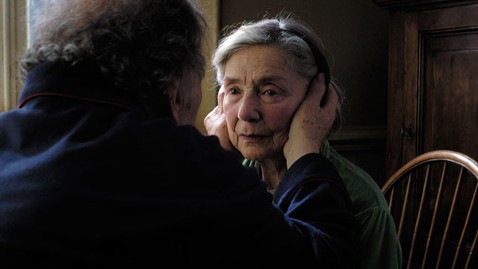Oscar-Winning 'Amour' Provides Unflinching Look at Aging, Dying

(Image Credit: Image credit: Sony Picture Classics)
Sarah Putnam reports:
Now that "Amour" has won the Oscar for best foreign-language film, let us pause for a moment to consider the significance of the Academy's nominating such a film for one of the most prestigious awards in Hollywood.
In "Amour," the French, who seem to have an innate cultural clarity and ability to talk about subjects that tie Americans in knots - think sex, food and political shenanigans - show us how to take an unflinching look at dying.
If the Academy of Motion Pictures has taken the unusual step of bestowing an Oscar to a French-language about aging and dying, could that mean that we are finally ready as a country to begin talking about such difficult issues?
It's refreshing to see the Academy's giving a vote of confidence to the cultural change that we at ABC News and The Conversation Project believe in.
Austrian filmmaker Michael Haneke frames this end-of-life story in a context of deep intimacy and emotional richness, even as he never sidesteps the grimness of decline. The extraordinary performances of veteran actors Jean-Louis Trintignant and Emmanuelle Riva as Georges and Anne take us step by step, detail by poignant detail, through the unraveling of the lives of this elegant elderly couple.
"Amour" is unquestionably, as its title declares, a love story. But it is also a portrayal of isolation amplified by pride, by reticence, by family dysfunction. Throughout the movie, this isolation becomes increasingly and unbearably, and quite literally, suffocating.
The story of Georges and Anne can be seen as a cautionary tale, provoking essential questions that all must face.
How do we cope with end of life? How do we best manage the challenges - physical, emotional, logistical - of this universal life passage? How can we alleviate the burdens dying imposes on our loved ones, on our survivors, on ourselves?
Sarah Putnam is a visual storyteller whose work as a photojournalist, both nationally and internationally, has been commissioned by magazines, corporations, and non-profits. Putnam has been involved with The Conversation Project since its inception.